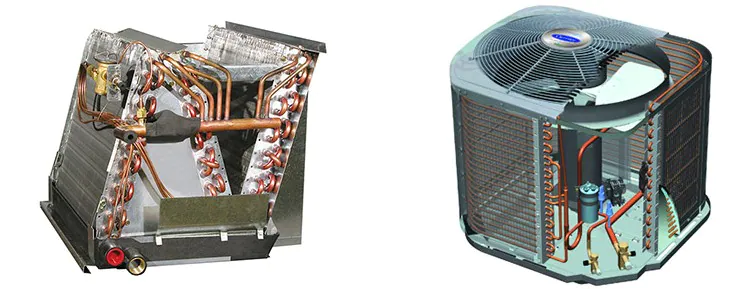Most consumers researching new air conditioners consider such factors as cooling capacity, energy efficiency ratings, filter types, and more. However, the condenser of an air conditioner is often overlooked. In case you didn’t know, modern air conditioners use one of three condenser materials: copper, aluminium, or alloy.
Copper and aluminium are the most common. AC cost, long-term durability, cooling efficiency, repairability, etc. are only some of the many factors to consider. Which one do you think is best, then? We’ve laid out the pros and cons of both condensers so you can make an informed decision.
Why is using AC piping important?
An evaporating coil, compressor, and condenser are the three fundamental building blocks of most air conditioners. The condenser and compressor are located outside the inner unit of the air conditioner, while the evaporator coils are located within. For window air conditioners, the setup is the same, but all the parts are combined into one housing unit.
An air conditioner works by drawing heat from the surrounding space into its evaporating coils, where it is then dissipated by a refrigerant. The refrigerant is then sent to a compressor unit, where it undergoes high-pressure, high-temperature compression. In the condenser, the hot liquid (our refrigerant) loses most of its heat.
The liquid then passes via a high-pressure valve, where it warms up to its original temperature and is sent back to the evaporator coil. This procedure is performed indefinitely until the required temperature is reached in the room. Pipes composed of copper or aluminum connect all of the essential components inside of an AC.
Piping is crucial since the entire cooling process operates in a closed circuit. If the quality of these pipes is low, there is a risk of leaks and cracks, which can reduce the efficiency of the air conditioning system. They may also be too thick to allow the air conditioner to function properly.
Copper Vs. Aluminium:
-
Effortless upkeep:
The condenser coils need to be cleaned on a regular basis because the outdoor unit is constantly subjected to dust and extreme temperatures. However, copper coils don’t rust and require little in the way of upkeep. Aluminum coils, on the other hand, are easily damaged, thus they must be stored in a sturdy cupboard. Because of this, keeping them tidy is a constant uphill battle.
-
Corrosion:
The rate of corrosion is a major factor in how long an AC lasts. Damage to the coils from corrosion prevents efficient heat transfer and might even lead to leaks. Therefore, preventing the coils from rusting is crucial. Due to the higher moisture content in the air, corrosion is more of a problem in humid climates and for individuals who live near seacoasts and salty water bodies.
The coils’ ability to transfer heat is diminished because corrosion forms a non-conducting layer over them. In order to extend the life of air conditioners, numerous cutting-edge solutions have been developed to shield the coils from corrosion. If you’re in the market for a new air conditioner, it’s a good idea to look for models that have corrosion-prevention features.
-
Price and pliability (the ability to be shaped in many ways):
The higher cost of copper over aluminum contributes to the higher final cost of the air conditioner. Aluminum has largely replaced other metals as the material of choice for air conditioners due to its lower per-unit production costs.
Flexibility is also an important consideration. When compared to copper, aluminium is more malleable and can be formed into a wider variety of shapes. This results in a significant increase in cost because three times as much copper is needed to create a coil of the same dimensions and shape. However, manufacturers are now able to produce copper coils at ever-decreasing thicknesses, which helps to lower the price of AC.
-
Heat transfer characteristics:
Copper’s excellent conductive characteristic makes it the ideal metal for heat transfer. Copper is a good choice for the condenser coil because it allows for rapid and efficient heat dissipation. Therefore, your air conditioner or refrigerator will effectively cool the space while using less energy.
Air conditioners with copper condenser coils are the best option if you value energy efficiency. The cooling efficiency of an aluminum coil is significantly lower than that of a copper coil.
-
Repairablity:
The term “repairability” refers to how simple it is to have the coil fixed. Minor leaks should be easier to be fixed without a lot of hassle or expense. Actually, if an aluminum coil is damaged, it needs to be replaced entirely and cannot be repaired. Therefore, copper coils are recommended over aluminum coils.
-
Ductility:
If you look closely, you’ll see that condenser coils are shaped like inverted “U”s, and that each coil has numerous turns of tubes. The many turns and length of this design allow for greater heat dissipation by the refrigerant. More ductile materials are required to form such curves. This indicates that the metal can be bent without completely fracturing.
Copper outperforms aluminum in ductility. A copper tube can be easily bent with bare hands without breaking, but the same cannot be said for aluminum. The weight of the copper tube is the only real issue. Copper is denser than aluminum. A copper coil, then, will be heavier than an aluminum coil of the same construction. Copper is more expensive because it weighs more.
-
Eco-friendly:
Aluminum condensers aren’t very eco-friendly because they’re so readily damaged. They leak dangerous gases like R22 and R410A when they break down. Copper condensers benefit from this since they last longer and use less power. Therefore, air conditioners with copper condensers are better for the user and the planet.


